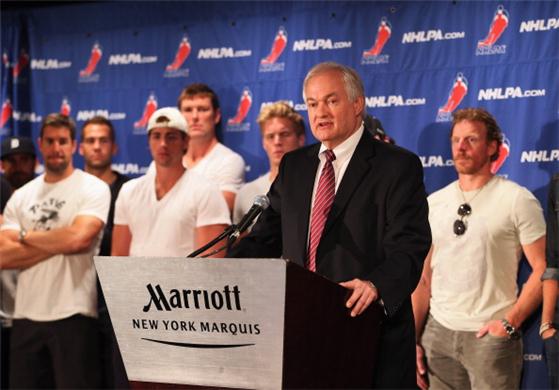Several days ago, the NHL played a dangerous game by giving fans something they haven’t had in a long time – hope. A proposal submitted to the NHLPA for consideration earlier this week looked like a giant step toward progress on a final deal. Now, negotiations look as entrenched as before.
The owners’ proposal addressed several key factors that players have expressed concerns about, including no salary rollbacks on existing contracts. It also offered a 50/50 of hockey-related revenue, down from the 57 percent that the players previously received, but up from the previous proposals tabled by the owners Other details of the deal included a five-year limit on contract length, two-year entry level contracts instead of three and a lowered salary cap to $59.9 million.
For fans, the proposal offered the hope that a full 82-game season would be salvaged by starting on Nov. 2 and awarding the Stanley Cup at the end of June.
But the initial responses from the players and subsequent negotiating sessions have all but squandered that hope.
First off, the NHL’s proposal was a great public relations tactic. It seemingly gave everyone involved exactly what they want. No salary rollback for the players, a 50/50 revenue split, a lower salary cap for the owners and a full 82-game season for everyone involved. But the players called out the proposal for what they believed it to be – negotiating in bad faith in order to gain public support.
“They’re trying to sway public opinion, and I don’t think that’s a secret,” said Chicago Blackhawks captain Jonathan Toews. “There’s no coincidence that they’ve been so quiet and all of a sudden they come out … talking about the season starting Nov. 2. They’re playing an angle there.”
After reviewing the proposal, the majority of players indicated they were “underwhelmed” by its contents.
“The proposal does represent movement from their last negotiating position,” executive director of the NHLPA Donald Fehr told players in a message, “but still represents very large, immediate and continuing concessions by players to owners, in salary and benefits (the Players’ Share) and in individual player contracting rules.”
Fehr continued to say that the proposal called for a reduction in hockey-related-revenue sharing to 50 percent from 57 percent this season.
“This is a reduction in the share of 12.3%. On last year’s revenue numbers, this would mean that players’ salaries would be cut by about $231 Million,” Fehr told players. “Over 6 years, this would save the owners an enormous amount of money, the precise amount depending on how fast revenue grows. For example, if revenue grows at 5%, which the owners predict, they save $1.651 Billion that would otherwise be paid to players. If revenue grows at 7.1%, the average rate over the last agreement, the Players’ Share is cut by $1.776 Billion. (If revenue never grows, the owners pay players $1.387 Billion less over 6 years.)”
The NHLPA subsequently made three counter proposals to the NHL – all of which were quickly denied by Bettman.
“It’s clear we’re not talking the same language at all in terms of what they came back to us with,” Bettman told reporters. “I am, to say the least, thoroughly disappointed.”
Bettman reiterated that he believes the NHLPA’s counter proposals indicate that negotiations have taken a “step backward.”
While all of the firm details of the NHLPA’s three proposals have not been leaked, Pittsburgh Penguins superstar Sidney Crosby indicated that the NHL rejected all three proposals within 10 minutes.
“It’s disappointing,” Crosby said. “We came in here today with those proposals thinking we could make some progress. It doesn’t look good right now.”
The NHL made a sound move earlier in the week to change public perception, but their tactic backfired when they appeared unwilling to even negotiate off of the NHLPA’s three counter-proposals. Again, Gary Bettman and the owners have displayed a “take-it-or-leave-it” attitude that eliminates much hope for compromise, or for the hockey season to start anytime soon for that matter.
“We do not yet know whether this proposal is a serious attempt to negotiate an agreement, or just another step down the road,” Fehr said after initially receiving the proposal. “The next several days will be, in large part, an effort to discover the answer to that question.”
The rejection of three counter proposals within 10 minutes seems to be pretty telling, don’t you think?


